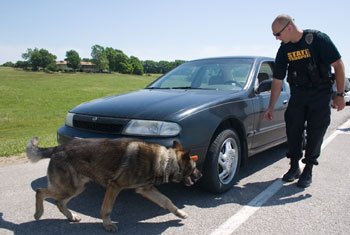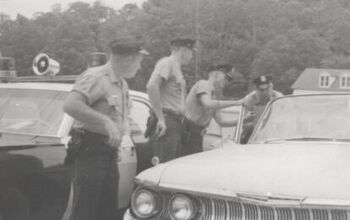Virginia: Supreme Court Restricts Search of Car Passengers
The Virginia Supreme Court on Friday ruled that police may not search vehicle passengers without a specific reason to believe that they may have committed a crime. The case began on April 19, 2006 when Suffolk police officers pulled over a car with four people on board at around 3pm. Once stopped on the side of the road, Officer J.B. Carr used his drug-sniffing dog, Xanto, to check the vehicle in question. Xanto “alerted by sitting and waiting for his reward” on the rear passenger’s side. Officer Jay Quigley ordered the vehicle’s occupants out so that the car could be thoroughly searched. Nothing was found. The police officers then proceeded to search the driver and two of the passengers. Nothing was found. Finally, passenger Travis Stacey Whitehead was searched and officers discovered two syringes and a bottle cap later identified as containing heroin residue. Whitehead was convicted of drug possession and sentenced to serve twenty-two months in jail.
Whitehead appealed, insisting that police cannot simply search every passenger of a vehicle without individualized probable cause for each person examined. He added that police had no reason to suspect him of criminal activity. The Virginia Court of Appeals upheld the conviction, stating that the process of elimination pointed to Whitehead’s guilt. The high court disagreed.
“After the positive alert by the trained narcotics detection dog, Officer Quigley unquestionably had probable cause to search the vehicle,” Justice Cynthia D. Kinser wrote. “However, without something more, the positive alert did not provide probable cause sufficiently particularized as to Whitehead to allow the search of his person.”
The high court examined US Supreme Court precedent on the matter which established the principle that mere proximity to criminal activity does not constitute probable cause justifying a warrantless search. The case law suggested that establishing a common criminal enterprise between the passengers would have been one way to meet the constitutional standard for a proper search.
“The Commonwealth presented no evidence, other than Whitehead’s status as a passenger in the vehicle, indicating that Whitehead and the other passengers were involved in any common enterprise involving criminal activity,” Kinser wrote. “There also was no evidence indicating Whitehead individually was committing, had committed, or was about to commit a criminal offense.”
The court found that the police had a strong suspicion after the drug dog alerted, but that it was just as likely that the dog had responded to an “old odor,” as his handler admitted in court testimony. Performing a search on this weak basis violated the Fourth Amendment, the court found. Courts in Idaho, Illinois and Maryland have also ruled that a drug dog alert is not sufficient to justify the arrest and search of passengers.
The Virginia Supreme Court ordered the case against Whitehead dismissed. A copy of the ruling is available in a 60k PDF file at the source link below.
Whitehead v. Virginia (Supreme Court of Virginia, 9/18/2009)
More by The Newspaper
Latest Car Reviews
Read moreLatest Product Reviews
Read moreRecent Comments
- Redapple2 Gen 1 - 8/10 on cool scale.Gen 2 - 3/10.
- SCE to AUX "...to help bolster job growth and the local economy"An easy win for the politicians - the details won't matter.
- Kjhkjlhkjhkljh kljhjkhjklhkjh so now we will PAY them your tax money to build crappy cars in the states ..
- SCE to AUX Yes, I'll miss it, and it doesn't make sense to kill off your 3rd-best seller. 2023 was its best year since 2018.
- SCE to AUX This was the same car I had (05 xB, stick, "camouflage" color) for 7 years - great car.We called ours "The Lunchbox". I added aftermarket wheels, and the 3rd-party cruise control the dealers could install.It suffered only two failures: bad window switch in week 2 (dealer fixed in 1 hour), bad trailing O2 sensor (fixed myself for $70). Fuel economy was always 28-34 mpg.It was a potential death trap, and ride quality became unbearable after 2 hours. I once did a 10-hour round trip in it and could barely walk after.Traded it for a 2012 Leaf, which was a better car in some ways.


































Comments
Join the conversation
@Marc You're correct - you're somewhere to the right of Attila. For you, I suppose, there is no Constitution. Results count, not rights. Of course, what the police invade next won't be his car, it'll be your house. And, then you'll be another Obama, complaining about the cops. Bottom line is that the individual freedoms define our liberty, and even those of the police. It's not about catching crooks. It's abut maintaining freedom.
Why on earth are we wasting such huge amounts of money on some looser that has a problem with drugs? The guy is caught with two needles and a trace amount of heroin and for that we are willing to throw him in jail for years costing the taxpayer 50-100.000$. Plus he will loose a couple of years of his life and have problem finding/holding a job for the rest of his life with a felony conviction on his record. That amount of money could fund after school program for a heard of kids, send several students through good university on a full scholarship, get green light bulbs for city hall, you name it… A fine, community service and some sort of mandated drug awareness class would cost a fraction of what prison time cost and might actually give the guy a change to sober up.